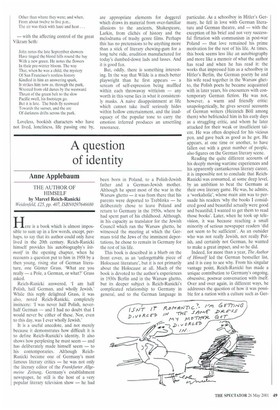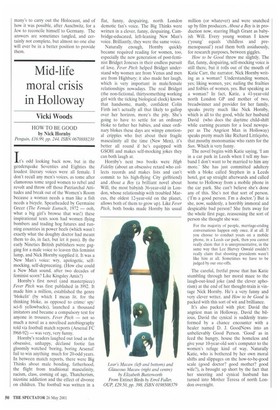A question of identity
Anne Applebaum
THE AUTHOR OF HIMSELF by Marcel Reich-Ranicki Weidenfeld, £25, pp. 407, ISBN0297646680 Here is a book which is almost impossible to sum up in a few words, except, perhaps, to say that its author could only have lived in the 20th century. Reich-Ranicki himself provides his autobiography's leitmotif in the opening chapter, when he recounts a question put to him in 1958 by a then young, rising star of German literature, one GUnter Grass. 'What are you really — a Pole, a German, or what?' Grass asked.
Reich-Ranicki answered, 'I am half Polish, half German, and wholly Jewish.' While this reply delighted Grass, it was also, noted Reich-Ranicki, completely insincere: 'I was never half Polish, neverhalf German — and I had no doubt that I would never be either of these. Nor, even to this day, was I ever wholly Jewish.'
It is a useful anecdote, and not merely because it demonstrates how difficult it is to define Reich-Ranicki's identity. It also shows how perplexing he must seem — and has deliberately made himself seem — to his contemporaries. Although ReichRanicki became one of Germany's most famous literary critics — he was not only the literaly editor of the Frankfurter Allgemeine Zeitung, Germany's establishment newspaper, he still is the host of a very popular literary television show — he had been born in Poland, to a Polish-Jewish father and a German-Jewish mother. Although he spent most of the war in the Warsaw ghetto — it was from there that his parents were deported to Treblinka — he deliberately chose to leave Poland and return to Germany in the 1950s, where he had spent part of his childhood. Although, in his capacity as translator for the Jewish Council which ran the Warsaw ghetto, he witnessed the meeting at which the Germans told the Jews of the imminent deportations, he chose to remain in Germany for the rest of his life.
This book is described in a blurb on the front cover, as an 'unforgettable piece of Holocaust literature', but it is not primarily about the Holocaust at all. Much of the book is devoted to the author's experiences in 1930s Berlin and in the Warsaw ghetto, but its deeper subject is Reich-Ranicki's complicated relationship to Germany in general, and to the German language in particular. As a schoolboy in Hitler's Germany, he fell in love with German literature and German theatre, and — with the exception of his brief and not very successful flirtation with communism in post-war Poland — that love remained his prime motivation for the rest of his life. At times, this book seems less like an autobiography and more like a memoir of what the author has read and when he has read it: the works that impressed him as a schoolboy in Hitler's Berlin, the German poetry he and his wife read together in the Warsaw ghetto, the Polish poets he became acquainted with in later years, his encounters with contemporary German fiction. He was not, however, a warm and friendly critic: unapologetically, he gives several accounts of German writers (Heinrich Boll among them) who befriended him in his early days as a struggling critic, and whom he later attacked for their weak or insufficient talent. He was often despised for his vicious pen, and gave back as good as he got. He appears, at one time or another, to have fallen out with a great number of people, also figures on the German literary scene.
Reading the quite different accounts of his deeply moving wartime experiences and his apparently cantankerous literary career, it is impossible not to conclude that ReichRanicki was consumed, at some deep level, by an ambition to beat the Germans at their own literary game. He was, he admits, a 'workaholic', whose main aim was to persuade his readers 'why the books I considered good and beautiful actually were good and beautiful; I wanted to get them to read those books'. Later, when he took up television, it was because reaching a small minority of serious newspaper readers 'did not seem to be sufficient'. As an outsider who was not really Jewish, not really Polish, and certainly not German, he wanted to make a great impact, and so he did.
Indeed, for more than a year, The Author of Himself led the German bestseller list, and it is easy to see why. From his singular vantage point, Reich-Ranicki has made a unique contribution to Germany's ongoing, obsessive, postwar conversation with itself. Over and over again, in different ways, he addresses the question of how it was possible for a nation with a culture such as Ger many's to carry out the Holocaust, and of how it was possible, after Auschwitz, for a Jew to reconcile himself to Germany. The answers are sometimes tangled, and certainly not complete, but almost no one else will ever be in a better position to provide them.



















































































 Previous page
Previous page